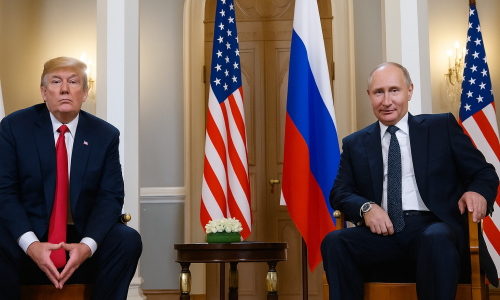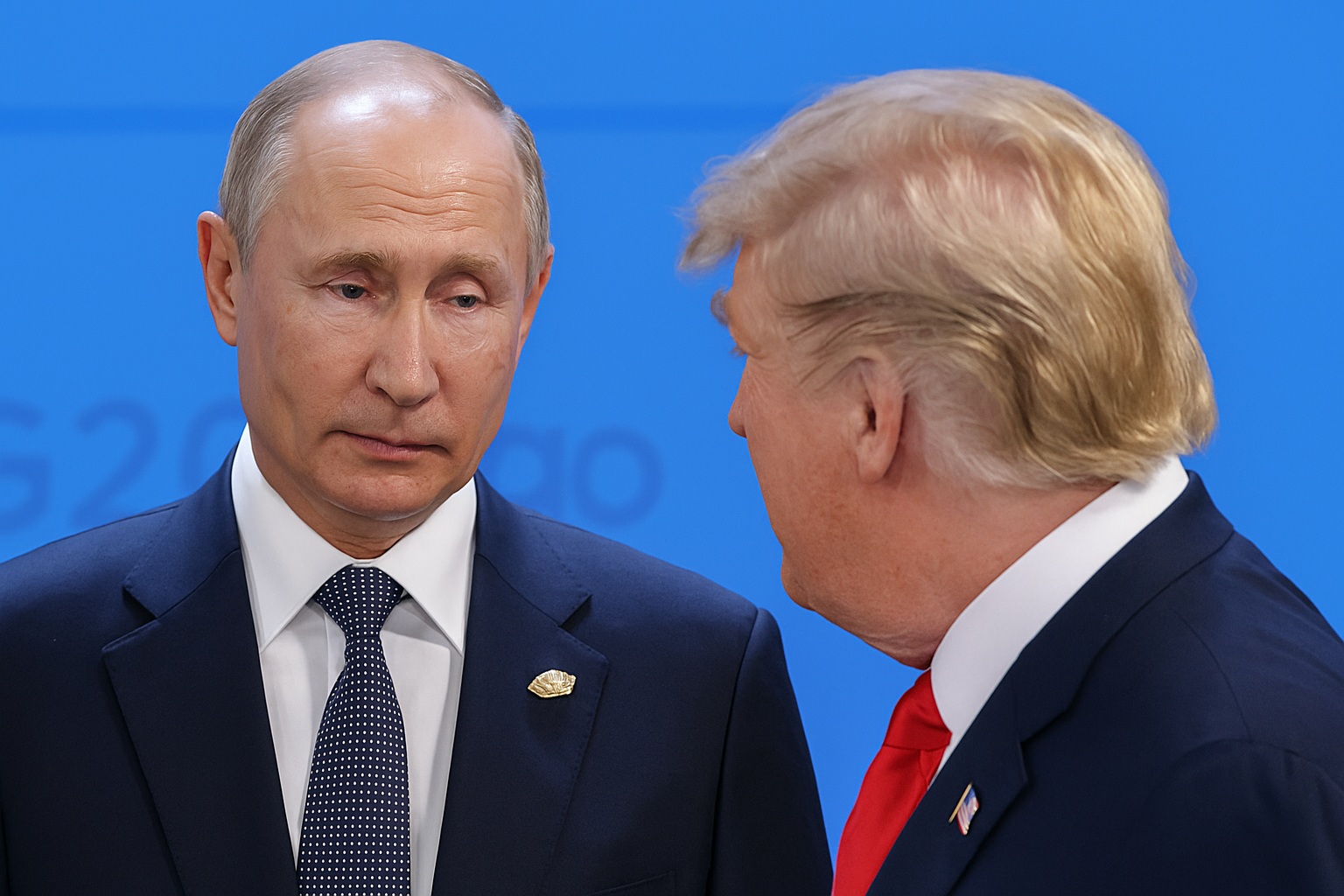The world was watching closely when the Trump Putin meeting in Alaska was announced. Leaders, analysts, and citizens alike hoped the summit might bring a thaw in U.S.-Russia relations, which have been strained for years. Alaska, chosen as the venue, carried symbolic weight—it is geographically close to both Russia and the United States, a “halfway house” between East and West.
But instead of breakthroughs, the Alaska meeting collapsed in dramatic fashion. The two leaders walked away without even a joint statement. This failure not only deepened tensions between Washington and Moscow but also created ripples across the globe. For India, which shares strong ties with both powers, the consequences are particularly complex.
This article breaks down what went wrong at the Trump Putin meeting, how it affects the U.S., Russia, and the global order, and what India must do to navigate this turbulent moment.
Table of Contents
Synopsis
The Trump Putin meeting in Alaska, aimed at mending relations, fell apart due to disagreements over the Ukraine ceasefire, NATO’s expansion policy, sanctions, and cybersecurity issues.
• For India, this entails tariff risks from Washington, pressure to take sides, and uncertainty over energy and defense supplies from Russia.
• The United States is currently under fire for Trump’s short-term diplomatic style, although Russia is anticipated to strengthen ties with China, Iran, and the Global South.
• The breakdown of the Alaska meeting emphasizes the importance of multipolarity, trade fragmentation, and digital sovereignty in the future global order.
• For India, this presents both a challenge and an opportunity: it can position itself as a stabilizer and peacemaker while boosting self-reliance.
What Went Wrong at the Alaska Meeting?
The Trump-Putin meeting in Alaska happened in mid-August 2025. These summits between American and Russian leaders often shape the global political climate, so expectations were high. However, the talks quickly fell apart due to deep-rooted disagreements.

1. Ukraine and NATO Expansion
• Putin demanded that NATO stop moving eastward and accept Russia’s control over disputed Ukrainian territory. Under pressure from Congress and defense officials, US President Trump declined to respond. Any surrender here would have been interpreted as a betrayal of NATO allies.
2. Russian Energy Sanctions
• Russia seeks relief from sanctions, particularly those affecting its oil and gas sectors.
• The US demands that Russia reduce its military presence in Eastern Europe before providing relief.
3. Cybersecurity and Election Interference
• The US is concerned about Russian hacking and alleged intervention in Western elections.
• Russia’s response: Putin dismissed the claims as propaganda and political theater.
India’s Position: A Delicate Balancing Act
India’s situation is unique. It has deep historical defense ties with Russia and growing economic and strategic relations with the U.S. The collapse of the Alaska meeting complicates India’s balancing act.
India welcomes the Summit meeting in Alaska between US President Donald Trump and President Vladimir Putin of Russia: @MEAIndia #Putin #Trump pic.twitter.com/SOCQLdshnz
— DD News (@DDNewslive) August 16, 2025
1. Tariff Threats from Washington: The U.S. may impose secondary tariffs on India for continuing trade with Russia. This is especially risky because:
• India imports discounted Russian oil.
• It has major defense deals with Moscow, including the S-400 missile system.
• Tariffs could hit Indian exports like IT services, pharmaceuticals, and emerging semiconductor industries.
2. Pressure to Choose Sides
India has long followed a policy of strategic autonomy—avoiding permanent alliances. But now:
• The U.S. wants India fully aligned with its Indo-Pacific strategy against China.
• Russia expects loyalty in its confrontation with the West.
Being forced to “choose” risks damaging ties with one or the other.
3. Energy & Defense Uncertainty
• With Russia isolated, future oil and defense supplies may become unreliable.
• U.S. sanctions could target Indian companies that engage with Russian firms.
4. An Opportunity for Leadership
Despite risks, the Trump Putin meeting collapse also creates opportunities. India could position itself as a neutral mediator between East and West. Few nations today have credibility with both Washington and Moscow. This could enhance India’s global role significantly.
Also read about- Mission “Sudarshan Chakra” launched on Independence Day 2025: India’s Bold Leap Toward Missile Defense Sovereignty
The U.S. After the Alaska Meeting
For Washington, the failed Trump Putin meeting shows the limits of Trump’s deal-making style.
• At home: Critics say Trump’s foreign policy is inconsistent and lacks vision.
• Abroad: Allies may start hedging—strengthening ties with other powers like China, Europe, or India rather than relying solely on Washington.
The U.S. still holds economic and military advantages, but the Alaska meeting failure shows unilateral diplomacy cannot solve complex global disputes.
Russia’s Strategic Pivot
For Moscow, the failed Alaska meeting was not unexpected. Putin likely anticipated resistance from Washington. The collapse only reinforced Russia’s belief that the West is unwilling to accommodate its security concerns.
Russia is now expected to:
• Deepen its partnership with China and Iran.
• Promote BRICS-based financial alternatives like BRICS Pay.
• Expand energy exports to Africa, Latin America, and Asia.
In short, Russia will accelerate its pivot toward the Global South, reducing dependence on the West.
The Bigger Picture: A Changing Global Order
The Trump Putin meeting in Alaska was more than a bilateral failure—it reflects deeper shifts in world politics.
1. Rise of Multipolarity: The era of U.S. dominance is fading. Countries like India, Brazil, Indonesia, and Turkey are emerging as important middle powers shaping global rules.
2. Fragmentation of Trade: Sanctions, tariffs, and geopolitical rivalries are pushing countries to create separate supply chains. Instead of one globalized system, we may see parallel blocs of trade.
3. Digital Sovereignty: Cybersecurity, artificial intelligence, and data governance are becoming central issues in diplomacy. Future conflicts may be fought more online than on the battlefield.
India’s Road Ahead
India’s foreign policy has been robust and has adapted quickly to such a changing landscape. Here are some key steps New Delhi might be considering in the coming future:
• Diversify Energy Sources – Reduce dependence on Russia not only by investing in renewable energy and deepening partnerships, but also by exploring with Middle Eastern suppliers.
• Boost Indigenous Defense Production – Accelerate Make in India programs to reduce reliance on foreign arms and move ahead with “Atmanirbhar Bharat”
• Use Multilateral Forums – Leverage platforms like BRICS, SCO, and G20 to advocate for a fairer, multipolar world order.
• Engage the U.S. Strategically – Deepen ties in technology, education, and climate while protecting strategic autonomy.
Conclusion
The Trump Putin meeting in Alaska was supposed to be a turning point. Instead, it ended in collapse, underscoring how fragile today’s global order really is.
For the U.S., it highlights the limits of unilateral deal-making. For Russia, it signals the need to pivot further toward non-Western partners. And for India, it is both a challenge and an opportunity.
If New Delhi plays carefully—balancing ties, investing in self-reliance, and positioning itself as a bridge between East and West—it can emerge not just as a survivor of this turbulent era, but as a shaper of the new global order. The world may be entering a phase of fragmentation and uncertainty, but for India, this could also be the moment to step up and lead.

Pratik Kondawale
Strategist | Indian Defence & Global Affairs
Founder of GeoLens.in, Pratik writes in-depth analysis on India’s defence strategy, military tech, and global power shifts delivering sharp insights through an Indian lens.

Nice answers in return of this matter with firm arguments and telling everything concerning that. http://www.kayswell.com
Everyday consumption of weight reduction capsules can offer a number of physical benefits, consisting of enhanced cravings guideline and improved metabolic activity. http://www.kayswell.com These effects might add to a lot more efficient fat oxidation and continual energy throughout the day. In addition, some formulas support immune health and wellness and supply antioxidant benefits, which can be valuable during weight decrease efforts,
Pretty! This has been an incredibly wonderful post. Thank you for providing this information.
Heya i am for the first time here. I found this board and I to find It truly helpful & it helped me out much. I hope to offer one thing back and help others like you aided me. http://www.kayswell.com
I am actually pleased to read this blog posts which contains lots of useful facts, thanks for providing these kinds of information. http://www.hairstylesvip.com
Ahaa, its fastidious discussion on the topic of this article at this place at this website, I have read all that, so now me also commenting at this place. http://www.kayswell.com
Thanks for one’s marvelous posting! I truly enjoyed reading it, you are a great author.I will ensure that I bookmark your blog and will often come back in the future. http://www.kayswell.com I want to encourage you to definitely continue your great posts, have a nice day!
It’s a pity you don’t have a donate button! I’d definitely donate to this fantastic blog! I guess for now i’ll settle for bookmarking and adding your RSS feed to my Google account. I look forward to new updates and will share this blog with my Facebook group. Talk soon! http://www.kayswell.com
I’m extremely impressed with your writing skills as well as with the layout on your weblog. Is this a paid theme or did you customize it yourself? Anyway keep up the excellent quality writing,it is rare to see a nice blog like this one today. http://www.kayswell.com
After exploring a few of the blog articles on your site, I seriously like your technique of blogging. I book-marked it to my bookmark webpage list and will be checking back soon. Take a look at my website as well and let me know what you think. http://www.kayswell.com
I think the admin of this website is in fact working hard in support of his website, as here every stuff is quality based stuff. http://www.kayswell.com
Great post. I was checking constantly this blog and I am impressed! Extremely useful information specifically the last part 🙂 I care for such information a lot. I was seeking this certain info for a long time. Thank you and good luck. http://www.kayswell.com
Good day! Would you mind if I share your blog with my zynga group?There’s a lot of folks that I think would really enjoy your content. Please let me know. Cheers http://www.kayswell.com
I’m not that much of a internet reader to be honest but your blogs really nice, keep it up! I’ll go ahead and bookmark your website to come back in the future. http://www.kayswell.com
I am genuinely thankful to the owner of this web page who has shared this fantastic post at here. http://www.kayswell.com
I am sure this article has touched all the internet people, its really really nice post on building up new blog. http://www.kayswell.com
I am curious to find out what blog platform you happen to be utilizing? I’m experiencing some minor security issues with my latest blog and I would like to find something more safeguarded. Do you have any suggestions? http://www.kayswell.com
It’s genuinely very difficult in this busy life to listen news on Television, so I just use world wide web for that reason, and take the most up-to-date news. http://www.kayswell.com
That is a very good tip especially to those new to the blogosphere. Short but very accurate information… Many thanks for sharing this one. A must read article! http://www.kayswell.com
First off I would like to say superb blog! I had a quick question which I’d like to ask if you don’t mind. I was interested to find out how you center yourself and clear your thoughts before writing. http://www.kayswell.com I have had a difficult time clearing my mind in getting my ideas out there.I truly do take pleasure in writing but it just seems like the first 10 to 15 minutes are
What a information of un-ambiguity and preserveness of valuable familiarity on the topic of unexpected feelings. http://www.hairstylesvip.com
If some one desires expert view concerning blogging afterward i advise him/her to pay a visit this weblog, Keep up the good work. http://www.hairstylesvip.com
Good post however , I was wanting to know if you could write a litte more on this topic? I’d be very thankful if you could elaborate a little bit more. Thank you! http://www.hairstylesvip.com
Wonderful goods from you, man. I’ve understand your stuff previous to and you’re just too excellent.I really like what you have acquired here, certainly likewhat you are stating and the way in which you say it.You make it entertaining and you still care for to keep it wise.I cant wait to read much more from you. http://www.ifashionstyles.com This is actually a wonderful site.
Right now it sounds like WordPress is the preferred blogging platform out there right now. (from what I’ve read) Is that what you are using on your blog? http://www.ifashionstyles.com
awesome